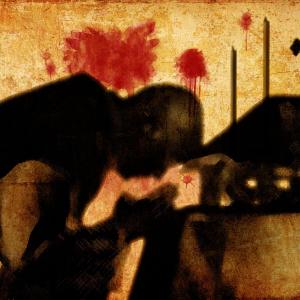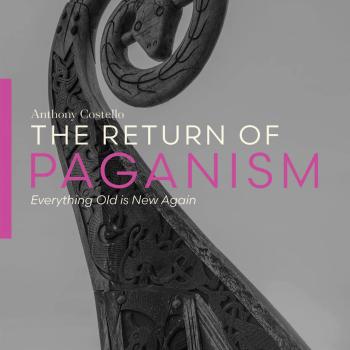Martyrdom is a notoriously misunderstood idea, at least in the Christian sense of the concept. Many today find the idea of martyrdom utterly distasteful. They either find it incredibly foolish, seeing it as a meaningless rejection of this world and the good things it offers. Or, alternatively, they find it very dangerous, in part for the same reasons, but also because of an aberrant version of martyrdom which entails the killing of others along with the annihilation of the self. Both these views, however, are not only gross mischaracterizations of martyrdom, as understood within the Christian revelation claim and its theological tradition, but are, in fact, themselves expressions of a pagan hedonism that runs into its own existential dangers.
3 Essential Features of Christian Martyrdom
All Christian martyrdom is in accord with and for the sake of Jesus Christ. Jesus is “the Way, the Truth and the Life,” but Jesus also sets the paradigm for all martyrdom by going to His death: His death on a cross. There are many facets to this one, great martyrdom (the martyrdom of martyrdoms). They are too many to elucidate here. But there are necessary features of the cross of Christ that we cannot miss if we are to properly grasp the meaning of martyrdom and recognize any genuine example of it. Here are three features of true martyrdom that Jesus’ death demonstrates for us.
First, Christ Died Out of Love
The singular motivation of God in sending His Son to die for us is love: the love of all mankind. Love is the first criteria for any true instance of martyrdom. That love can be for truth in the concrete and particular: dying for another person, regardless of whether they be friend (John 15:13) or enemy (Rom 5:6-7). Or, it can be love for truth in the abstract: dying for what one knows to be true about Jesus (Acts 7) or Jesus’ world (Gen 1:27-28) or His revelation to the world (2 Cor 4:1-12). Because true martyrdom can only be done out of love for the truth, any act of violence that violates truth cannot, therefore, be one of love, and, if not an act of love, not a genuine martyrdom.
Thus, any death that entails the death of another person, hence violating the truth of the Imago Dei— the intrinsic value of all persons–cannot be martyrdom. “Martyrdom” that intends to kill others is a criminal act and nothing less, although it could be, and probably is, something more, namely: blasphemy. Whenever we hear of a suicide bomber, for example, in the Islamic world, this “martyr” is actually a blasphemer. He, or she, is one who appropriates God’s name, or some name for God, to propagate a lie– and a very profound one at that. “Martyrdom operations,” as we termed them in Operation Enduring Freedom, could have easily been called “Blasphemy operations.”
Second, any act of “martyrdom” motivated by a selfish purpose, like a strange sense of self-glorification, is also not martyrdom. St. Paul, himself martyred, makes this crystal clear in his first letter to the Corinthian church:
If I speak in the tongues of men and of angels, but have not love, I am a noisy gong or a clanging cymbal. 2 And if I have prophetic powers, and understand all mysteries and all knowledge, and if I have all faith, so as to remove mountains, but have not love, I am nothing.3 If I give away all I have, and if I deliver up my body to be burned, but have not love, I gain nothing.
1 Cor 13:1-3
A “martyr” who gives up everything he has, even his life, and even to the point of a horribly painful death has done “nothing” if he is not motivated by love. Anyone who dies either out of contempt for another person, or group of people, or who dies in order to be seen as great or heroic has literally died for nothing according to Paul. In the former case, the death is as tragic as it is appalling. In the latter case, it is simply pitiable. Jesus could have had all the glory prior to the cross, He didn’t need crucifixion to be glorified (Matt 4:5-11). Jesus also would have been right to destroy us sinners. He didn’t need the cross to be just. But Jesus chose the cross: where justice and mercy, and humiliation and glory, met.
Second, Christ Gave Up His Life Freely
Jesus, being fully God, prior to His incarnation was absolutely free to choose anything that was consistent with the nature of God. Although God cannot do evil, God can do many good things: infinitely many good things, in fact. And so God is free to demonstrate love in a variety of ways. In Jesus, however, God chooses to demonstrate love in what, for us, is most demonstrative: in the voluntary abdication of His divine powers. An early creed of the Church sums up this metaphysical and historical fact:
5 You must have the same attitude that Christ Jesus had.
6 Though he was God,
he did not think of equality with God
as something to cling to.
7 Instead, he gave up his divine privileges;
he took the humble position of a slave
and was born as a human being.
When he appeared in human form,
8 he humbled himself in obedience to God
and died a criminal’s death on a cross.Phil 2:5-11 (NLT)
The free abdication of our privilege of living is a second, necessary feature of martyrdom. Any death that is compelled by some external force or pressure cannot be counted as a true martyrdom. Martyrdom is not done reluctantly, at least not in the end (obviously there can be some natural hesitancy in the process of decision making). But where or when there is psychological or social manipulation, or religious fear-mongering, there there cannot be genuine martyrdom. Again, the first criteria for martyrdom being love, not fear, entails that any handing over of oneself for destruction be a voluntary act, not one born out of coercion or manipulation.
Third, Christ Died for Freedom
Ultimately the point of Christ’s own martyrdom was freedom: freedom for the world.
It was for freedom that Christ set us free; therefore keep standing firm and do not be subject again to a yoke of slavery.
Gal 5:1
Any act of martyrdom that is conducted out of love (for truth) and carried out voluntarily ultimately has freedom as its aim. The telos of any act of martyrdom is this, and this alone: to testify with one’s own life to the truth out of love. In doing so, the Christian demonstrates most concretely and to the greatest degree the real nature of freedom. Freedom is not found in anything of this world, or in the attaining of any amount or type of this-worldly good or wealth. Ultimate freedom is found in the liberation of the human soul from the bonds of sin, to the glory of God and, to be sure, to the hope of eternal life. The martyr sees this and knows it. He understands what Paul, also martyred for truth and love, understood when he wrote this to a church in (modern day) Turkey:
Therefore, if you have been raised with Christ, keep seeking the things that are above, where Christ is, seated at the right hand of God. 2 Set your minds on the things that are above, not on the things that are on earth. 3 For you have died, and your life is hidden with Christ in God. 4 When Christ, who is our life, is revealed, then you also will be revealed with Him in glory.
Col 3:1-4
It is over this last point, this idea of martyrdom being about freedom, that most secularists stumble. This is inconceivable to many of a pagan mind: both ancient and modern.
Do Christians Hate Life?
It is in the free abdication of life for the sake of being free that many secularists and pagans misunderstand Christian martyrdom. They falsely assume that Christians literally hate life, or their lives, or the good things of life, and, like Gnostics, long to die or escape life, and, as such, seek every opportunity to do so.
Ancient pagans expressed this false idea about Christians hating life quite vociferously. In his most famous passage, on Nero’s persecution of Christians in Rome, the historian Tacitus, put it this way:
Consequently, to get rid of the report, Nero fastened the guilt and inflicted the most exquisite tortures on a class hated for their abominations, called Christians by the populace. Christus, from whom the name had its origin, suffered the extreme penalty during the reign of Tiberius at the hands of one of our procurators, Pontius Pilatus, and a most mischievous superstition, thus checked for the moment, again broke out not only in Judaea, the first source of the evil, but even in Rome, where all things hideous and shameful from every part of the world find their centre and become popular. Accordingly, an arrest was first made of all who pleaded guilty; then, upon their information, an immense multitude was convicted, not so much of the crime of firing the city, as of hatred against mankind.
Tacitus, Annals, 15.44 [emphasis added]
Modern pagans like Michael York imply the same about the Christian disposition toward life in the here and now when they describe their own Pagan ideas:
The burden of paganism is its necessity to accept the pleasurable without guilt or intimidation. The hedonic is for the pagan the gift of her gods, one to be celebrated and enjoyed. There is no denial or austerity unless these are directed toward a particularly sought goal—such as initiation or shamanic trance. In general, the pleasurable—whether sensual or intellectual—constitutes the raison d’être for living the pagan life. A puritanical god that forbids and rejects this-worldly pleasure is one that the pagan will in turn reject.
Michael York, “Pagan Theology” in The Handbook of Contemporary Paganism, 295
This pagan interpretation of not only sublimation of the pleasurable for a higher good, but also the greatest example of it: martyrdom, is understandable given Jesus’ own teachings. In many places, Jesus teaches directly about how we must “hate our lives.” For example, in Mark 8:34-38, Jesus says explicitly:
34 And He summoned the crowd together with His disciples, and said to them, “If anyone wants to come after Me, he must deny himself, take up his cross, and follow Me. 35 For whoever wants to save his life will lose it, but whoever loses his life for My sake and the gospel’s will save it. 36 For what does it benefit a person to gain the whole world, and forfeit his soul? 37 For what could a person give in exchange for his soul? 38 For whoever is ashamed of Me and My words in this adulterous and sinful generation, the Son of Man will also be ashamed of him when He comes in the glory of His Father with the holy angels.”
There are too many examples of Christian sublimation, both in dominical red-letter teachings, as well as in the rest of the New Testament, to deny that self-denial and a real rejection of the world is not part of the Christian life. It is. However, we cannot identify this “hatred of the world” with a hatred of God’s creation, which is, as York points out, a gift to be celebrated and enjoyed. Hatred of the world is not hatred of what God has made.

Clement of Alexandria on the Martyr’s Relation to the World
The 2nd century Church Father, Clement of Alexandria, a Greek philosopher prior to his conversion to Christ, articulates the right understanding of how the martyr “hates the world.” It is not disgust with the world that motivates the martyr to be open to death. It is actually a form of love for the world that drives her. The difference is in one’s evaluation of good things by degree and not by kind. For the martyr, the most relevant things are the nature of the soul and of the body. For the point of decision is whether or not to sacrifice the body for the sake of truth, which relates to the soul. Clement puts it this way:
The soul of man is confessedly the better part of man, and the body the inferior. But neither is the soul good by nature, nor, on the other hand, is the body bad by nature. Nor is that which is not good straightway bad. For there are things which occupy a middle place, and among them are things to be preferred, and things to be rejected. The constitution of man, then, which has its place among things of sense, was necessarily composed of things diverse, but not opposite — body and soul.
Clement of Alexandria, The Stromata, Book IV.26
The soul and body are both good; but not entirely good. And while the soul is the better part and the body inferior, this doesn’t mean what pagans often think it does, namely, that the body is without value. However, both body and soul are corrupted by sin, and, ultimately, it is this corruption that the Christian righty hates. Here the pagan refuses to acknowledge what we all know to be the case: that the world is not the way it is supposed to be. As such, the pagan must accept corruption, and the pain it brings, as if it is all part of god, i.e., of nature. On an authentically pagan view, even cancer cannot be judged as “malevolent.”
The Christian, however, can hate the corrupted world without hating physical nature as such. The physical nature that will emerge when God reconstitutes the world at the end of time, to include our physical bodies, is not something the Christian dreads. Physicality as such, unlike in various Gnostic traditions, is not the problem. Bodies, as such, are not evil. After all, God created a physical world for us and our physical bodies. Thus, the Martyr does not hate the material world. He only sees the world in its right place. This is so much so the case, that for anyone who thinks they can “seek out” death, Clement has a strong warning. In commenting on Jesus’ words in Matthew 10:23, where Christ says to flee persecution, Clement remarks:
He [Christ] does not advise flight, as if persecution were an evil thing; nor does He enjoin them by flight to avoid death, as if in dread of it, but wishes us neither to be the authors nor abettors of any evil to any one, either to ourselves or the persecutor and murderer. For He, in a way, bids us take care of ourselves. But he who disobeys is rash and foolhardy. If he who kills a man of God sins against God, he also who presents himself before the judgment-seat becomes guilty of his death. And such is also the case with him who does not avoid persecution, but out of daring presents himself for capture. Such a one, as far as in him lies, becomes an accomplice in the crime of the persecutor.
The Stromata, Book IV.10
Anyone foolhardy enough to seeks out persecution and not avoid its dangers is, according to Clement, abetting evil. For every martyr is also a human person and, as such, made in the image and likeness of God. The Christian who in any way tempts their oppressors to kill them is him or herself partially responsible for their persecutor’s wickedness. One does not rashly present one’s own life “before the judgement-seat” and simply get away with it. Thus, we do not hate the world so much as to not love life. That is why every true Christian is radically pro-life, from conception to natural death, to include his or her own life.
For many pagans today, however, any form of sublimation is itself a great transgression: a sin against the life instinct and the hedonic impulse. While Paganism may have its many sacrifices, there cannot, in principle, be such a thing as pagan martyrdom. The only reason for the pagan to embrace death being that life itself has lost its savor. Of course, if the pleasures of life fail to satisfy the pagan, that should at least arouse curiosity as to why.
In sum, the Christian martyr is the man or woman who, in virtue of not loving the material world more than God or his or her own soul, testifies to the truth out of a motivation of love and for the sake of demonstrating to the world where true freedom lies, namely, in the eternal places with God, our Creator, and the Son, our Savior.


















